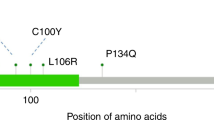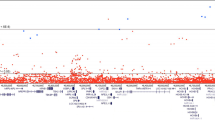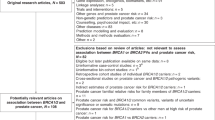Abstract
Germline HOXB13 G84E mutation has been consistently associated with prostate cancer (PCa) risk, but its association with other cancers is controversial. We systematically tested its association with the 20 most common cancer types in subjects from the UK Biobank. The G84E mutation was found in 1,545 (0.34%) of 460,224 participants of European ancestry. While mutation status did not associate with cancer risk in females, it was significantly associated with increased risk in males; odds ratio (OR) (95% confidence interval) for overall cancer diagnosis was 2.19 (1.89–2.52), P = 2.5E-19. The association remained after excluding PCa; OR = 1.4 (1.16–1.68), P = 0.003, suggesting association with other cancers. Indeed, suggestive novel associations were found for two other cancer types; rectosigmoid cancer, OR = 2.25 (1.05–4.15), P = 0.05 and non-melanoma skin cancer (NMSC), OR = 1.40 (1.12–1.74), P = 0.01. For NMSC, the association was found only in basal cell carcinoma, OR = 1.37 (1.07–1.74), P = 0.03. These findings have potential clinical utility for genetic counselling regarding HOXB13.
Similar content being viewed by others
Background
HOXB13 was identified as a prostate cancer (PCa) susceptibility gene in 2012.1 A recurrent germline mutation (G84E) found exclusively in European descendants co-segregated with PCa diagnosis in families and presented at a significantly higher frequency in PCa patients (1.4%) compared to unaffected controls (0.1–0.4%) in the population. These findings have been consistently replicated in large published studies.2,3 In addition, suggestive evidence for associations between the G84E mutation and risk for leukaemia, bladder cancer, kidney cancer, non-Hodgkin’s lymphoma, and breast cancer was reported, although results were inconclusive due to small sample sizes of carriers.4,5 The objective of this study is to systematically assess the association of G84E mutation with risk for the 20 most common types of cancer in a large population-based study.
Methods
Subjects of this study were from the UK Biobank (UKB), a population-based study with extensive genetic and phenotypic data for approximately 500,000 individuals from across the United Kingdom aged between 40 and 69 at recruitment (accessed under Application Number: 50295).6 Diagnosis of the 20 most common cancers, ranked by the 2018 GLOBOCAN database,7 were obtained from self-report, inpatient diagnosis, and the UK cancer registry. The G84E mutation (rs138213197) status was obtained from the UKB Axiom SNP genotype array. Odds ratio (OR) and 95% confidence interval (CI) were estimated separately in males and females using the logistic regression model adjusting for age at study recruitment and the top two principal components derived from 10,000 randomly selected SNPs across the genome.
Results
A total of 1,545 HOXB13 G84E mutation carriers were found in 460,224 self-reported European descendants (all heterozygotes), resulting in a carrier rate of 0.34%. The vast majority of carriers (73%) did not have a reported family history of cancer (family history among parents and siblings was reported for prostate, breast, colorectal, and lung cancer in the UKB). While the mutation was not associated with any cancer risk in females, it was significantly associated with overall cancer risk in males; OR (95% CI) was 2.19(1.89–2.52) for at least one type of cancer, P = 2.5E-19 (Table 1). The association remained after excluding PCa, OR = 1.4(1.16–1.68), P = 0.003, suggesting the mutation increases risk to other types of cancer besides of PCa.
When examining specific cancer types, we confirmed the association between the mutation and PCa risk [OR = 4.81 (4.06–5.68), P = 1.32E-53] and found two novel suggestive/weak/marginal associations. For non-melanoma skin cancer (NMSC), the male G84E carrier rate was 0.47% in 13,480 cases and 0.34% in 196,874 controls, OR = 1.40 (1.12–1.74), P = 0.01. Specifically, the association was found in basal cell carcinoma (BCC) [OR = 1.37 (1.07–1.74), P = 0.03] but not in squamous cell carcinoma (SCC) [OR = 0.84 (0.39–1.55), P = 0.68]. In comparison, the mutation was not significantly associated with BCC or SCC in females.
For rectosigmoid cancer, the male mutation carrier rate was 0.77% in 780 cases and 0.34% in 209,574 controls [OR = 2.25 (1.05–4.15), P = 0.05]. It is noted that the mutation had a higher but not statistically significant risk for rectal cancer [OR = 1.77 (0.96–2.95), P = 0.09] but not with more proximal colon cancers [OR = 1.02 (0.57–1.65), P = 0.96]. In females, the G84E mutation was not significantly associated with rectosigmoid, rectal, or colon cancer.
We also tested the association between G84E mutation and risk for developing multiple types of cancers concurrently. A significant association was found in males only; 5.39% of mutation carriers but 2.61% of non-carriers had two or more types of cancer [OR = 2.43 (1.75–3.36), P = 7.96E-08]. When the analysis was repeated after excluding PCa, NMSC and rectosigmoid cancer, no association was found [OR = 1.11 (0.41–2.97), P = 1.00]. These results further suggest the association of G84E mutation with multiple types of cancer is limited to these three types of cancer.
Discussion
Our finding that the mutation is associated with risk to multiple types of cancer is consistent with a report from a large Kaiser Permanente cohort (N = 83,285) where the mutation was imputed (r2 = 0.57 with genotyped data).5 For specific types of cancer, we did not confirm previously reported higher carrier rates found in patients of bladder cancer,4 leukaemia,4 kidney cancer,5 non-Hodgkin’s lymphoma,5 and breast cancer.5 The number of mutation carriers were limited (<50) in each of these cancers.
A unique feature of this population-based study was that cancer cases were not selected based on clinical characteristics or family history; therefore, results are more applicable to the general population for developing broad genetic testing and counselling regarding HOXB13. The strong association of the G84E mutation and PCa risk (OR = 4.81) from this population-based study, together with the consistent finding from previously published studies, suggest this mutation be included in germline testing for assessing PCa risk for men in their thirties and forties. Men positive for this mutation should be considered as high risk for PCa, and this information should be considered by physicians and patients when discussing the need, timing, and frequency of PCa screening. The clinical implication of the G84E mutation on other types of cancer such as NMSC and rectosigmoid cancer, however, requires additional confirmation studies in independent study populations.
HOX genes encode homeodomain transcription factors that play a critical role in establishing the basic body plan during embryogenesis.8 HOXB13 expression in the mouse embryo is highly restricted to the urogenital sinus (i.e. the anlage of the prostate and bladder), hindgut, and tailbud.9 In adult humans, HOXB13 continues to be highly expressed in the prostate and to a lesser extent in the bladder, sigmoid and transverse colon, and skin (The Genotype-Tissue Expression [GTEx]). In the mouse foetus, HOXB13 plays a role in cutaneous development and regeneration.10 Thus, several adult tissues which retain HOXB13 expression appear to have an elevated risk of developing cancer in carriers of the G84E allele. Despite similar expression levels of HOXB13 in the distal colon and skin in both sexes (GTEx), increased cancer risk was observed only in males. While it is tempting to speculate that androgens may sensitise tissues for G84E-associated carcinogenesis, the mechanism of this difference remains unknown.
Several limitations are noted. First, despite being the largest study on HOXB13, the number of G84E mutation carriers remains small in individuals with cancers other than prostate. Therefore, null associations should be interpreted with caution, especially for relatively uncommon types of cancer. The estimated power was limited for most of the cancers except NMSC, PCa (in male) and breast cancer (in female) (Table 1). Second, the age range of subjects in the UKB (40–69 years) may lead to under-estimated carrier frequency and OR if the mutation is associated with early deaths. Third, the reported P-values for the associations between the G84E mutation and risk to NMSC and rectosigmoid cancer were not corrected for multiple testing. The associations of the mutation with NMSC and rectosigmoid cancer were not statistically significant after adjusting for 42 multiple tests. Confirmation of these novel findings in an independent population is required.
Conclusions
In conclusion, the HOXB13 G84E mutation carrier rate is relatively common (0.34%) in European descendants. Male mutation carriers are clearly at increased risk for PCa, and possibly NMSC and rectosigmoid cancer, while no evidence of increased risk of any cancer was observed in females. These findings, if confirmed in other independent studies, may have potential clinical utility for genetic counselling.
References
Ewing, C. M., Ray, A. M., Lange, E. M., Zuhlke, K. A., Robbins, C. M., Tembe, W. D. et al. Germline mutations in HOXB13 and prostate-cancer risk. N. Engl. J. Med. 366, 141–149 (2012).
Nyberg, T., Govindasami, K., Leslie, G., Dadaev, T., Bancroft, E., Ni Raghallaigh, H. et al. Homeobox B13 G84E mutation and prostate cancer risk. Eur. Urol. 75, 834–845 (2019).
Isaacs, W. B., Cooney, K. A. & Xu, J. Updated insights into genetic contribution to prostate cancer predisposition: focus on HOXB13. Can. J. Urol. 26(5 Suppl 2), 12–13 (2019).
Beebe-Dimmer, J. L., Hathcock, M., Yee, C., Okoth, L. A., Ewing, C. M., Isaacs, W. B. et al. The HOXB13 G84E mutation is associated with an increased risk for prostate cancer and other malignancies. Cancer Epidemiol. Biomark. Prev. 24, 1366–1372 (2015).
Hoffmann, T. J., Sakoda, L. C., Shen, L., Jorgenson, E., Habel, L. A., Liu, J. et al. Imputation of the rare HOXB13 G84E mutation and cancer risk in a large population-based cohort. PLoS Genet 11, e1004930 (2015).
Bycroft, C., Freeman, C., Petkova, D., Band, G., Elliott, L. T., Sharp, K. et al. The UK Biobank resource with deep phenotyping and genomic data. Nature 562, 203–209 (2018).
Bray, F., Ferlay, J., Soerjomataram, I., Siegel, R. L., Torre, L. A. & Jemal, A. Global cancer statistics 2018: GLOBOCAN estimates of incidence and mortality worldwide for 36 cancers in 185 countries. CA Cancer J. Clin. 68, 394–424 (2018).
Krumlauf, R. Hox genes in vertebrate development. Cell 78, 191–201 (1994).
Zeltser, L., Desplan, C. & Heintz, N. Hoxb-13: a new Hox gene in a distant region of the HOXB cluster maintains colinearity. Development 122, 2475–2484 (1996).
Stelnicki, E. J., Arbeit, J., Cass, D. L., Saner, C., Harrison, M. & Largman, C. Modulation of the human homeobox genes PRX-2 and HOXB13 in scarless fetal wounds. J. Invest Dermatol 111, 57–63 (1998).
Acknowledgements
We are grateful to the Ellrodt-Schweighauser, Chez and Melman families for establishing Endowed Chairs of Cancer Genomic Research and Personalized Prostate Cancer Care at NorthShore University HealthSystem in support of Dr. Xu and Dr. Helfand, the Rob Brooks Fund for Personalized Prostate Cancer Care at NorthShore University HealthSystem. Likewise, the support of W.T. Gerrard, Mario Duhon, Jennifer and John Chalsty is gratefully acknowledged by Dr. Isaacs. The authors gratefully acknowledge the generous support from donors to The Patrick C. Walsh Hereditary Prostate Cancer Research Program at The Brady Urological Institute.
Author information
Authors and Affiliations
Contributions
Concept: W.I. and J.X. Data analysis: J.W., Z.S., R.N. and C.W. Data interpretation: W.K.R., S.L.Z., P.H., K.C., B.H., W.I. and J.X. Paper draft: J.W., Z.S., W.I. and J.X. Paper revision: J.W., Z.S., R.N., C-H.W., W.K.R., S.L.Z., P.H., K.C., B.H., W.I. and J.X.
Corresponding author
Ethics declarations
Ethics approval and consent to participate
The UK Biobank was approved by North West – Haydock Research Ethics Committee (REC reference: 16/NW/0274; IRAS project ID: 200778). Data from the UK Biobank was accessed through a Material Transfer Agreement under Application Reference Number: 50295. This study was performed in accordance with the Declaration of Helsinki. All UK Biobank participants provided informed consent prior to participation in the study.
Data availability
The data used in this study is available in the UK Biobank, a publicly available repository. Data was accessed through a Material Transfer Agreement under Application Reference Number: 50295. For additional information, please feel free to contact the corresponding author, Jianfeng Xu, DrPH.
Competing interests
The authors declare no competing interests.
Funding information
This study was partially supported by grants from Department of Defense (W81XWH-16-1-0764, W81XWH-16-1-0765, and W81XWH-16-1-0766), the National Cancer Institute (P30CA006973), and the Rolfe Pancreatic Cancer Foundation.
Additional information
Note This work is published under the standard license to publish agreement. After 12 months the work will become freely available and the license terms will switch to a Creative Commons Attribution 4.0 International (CC BY 4.0).
Publisher’s note Springer Nature remains neutral with regard to jurisdictional claims in published maps and institutional affiliations.
Rights and permissions
This article is licensed under a Creative Commons Attribution 4.0 International License, which permits use, sharing, adaptation, distribution and reproduction in any medium or format, as long as you give appropriate credit to the original author(s) and the source, provide a link to the Creative Commons licence, and indicate if changes were made. The images or other third party material in this article are included in the article's Creative Commons licence, unless indicated otherwise in a credit line to the material. If material is not included in the article's Creative Commons licence and your intended use is not permitted by statutory regulation or exceeds the permitted use, you will need to obtain permission directly from the copyright holder. To view a copy of this licence, visit http://creativecommons.org/licenses/by/4.0/.
About this article
Cite this article
Wei, J., Shi, Z., Na, R. et al. Germline HOXB13 G84E mutation carriers and risk to twenty common types of cancer: results from the UK Biobank. Br J Cancer 123, 1356–1359 (2020). https://doi.org/10.1038/s41416-020-01036-8
Received:
Revised:
Accepted:
Published:
Issue Date:
DOI: https://doi.org/10.1038/s41416-020-01036-8



